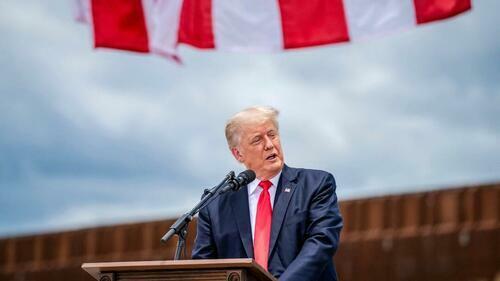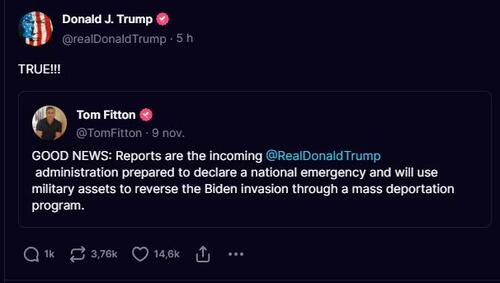
President-elect Donald Trump confirmed Monday that he will declare a national emergency to carry out mass deportations.
In response to Judicial Watch president Tom Fitton's post on Truth Social that Trump was "prepared to declare a national emergency and will use military assets to reverse the Biden invasion through a mass deportation program," Trump replied "TRUE!!"
"On day one, I will launch the largest deportation program ... in the history of our country," Trump said at one of his final campaign events in Pittsburgh on Nov. 4, a day before the election. "I will rescue every city and town that has been invaded ... and we will put the vicious and bloodthirsty criminals in jail."
Officially, there are an estimated 11 million illegal migrants living in the US (and some say upwards of 20 million) who entered the country during the Biden administration. Trump has tapped Tom Homan, former acting head of Immigration and Customs Enforcement (ICE), to serve as his "border czar," as well as South Dakota Gov. Kristi Noem as his secretary of the Department of Homeland Security (DHS) to secure the border and expel those living in the country illegally.
Homan said last weekend that he will prioritize "the worst first" in targeted deportations.
Immigration advocates, meanwhile, are preparing to counter Trump in court, Axios reports.
"We're ready to fight" mass raids and deportations "both at the legal level, at the advocacy level, and (by) going to the streets," according to Maribel Hernández Rivera, director of policy and government affairs for border and immigration at the American Civil Liberties Union (ACLU).
"One of the things that we strongly believe is that when the American people realize what this threat means, they're not going to go for it."
That said, Trump's team is looking to craft executive orders that can withstand legal challenges in order to avoid a similar defeat to his first-term Muslim ban, Politico reports. The incoming administration also plans to end the parole program for undocumented immigrants from Cuba, Haiti, Nicaragua and Venezuela.
Trump’s 2017 executive order on border security, signed on Jan. 25, 2017, directed the Department of Homeland Security to close the border and to take several other immediate steps, including building more sections of the U.S.–Mexico border wall and adding 5,000 Border Patrol agents.
That initial order also called for revamping the way that the government handled illegal immigrants’ asylum claims, detentions, and deportations.
President-elect Donald Trump confirmed Monday that he will declare a national emergency to carry out mass deportations.
In response to Judicial Watch president Tom Fitton’s post on Truth Social that Trump was “prepared to declare a national emergency and will use military assets to reverse the Biden invasion through a mass deportation program,” Trump replied “TRUE!!”
“On day one, I will launch the largest deportation program … in the history of our country,” Trump said at one of his final campaign events in Pittsburgh on Nov. 4, a day before the election. “I will rescue every city and town that has been invaded … and we will put the vicious and bloodthirsty criminals in jail.“
Officially, there are an estimated 11 million illegal migrants living in the US (and some say upwards of 20 million) who entered the country during the Biden administration. Trump has tapped Tom Homan, former acting head of Immigration and Customs Enforcement (ICE), to serve as his “border czar,” as well as South Dakota Gov. Kristi Noem as his secretary of the Department of Homeland Security (DHS) to secure the border and expel those living in the country illegally.
Homan said last weekend that he will prioritize “the worst first” in targeted deportations.
Immigration advocates, meanwhile, are preparing to counter Trump in court, Axios reports.
“We’re ready to fight” mass raids and deportations “both at the legal level, at the advocacy level, and (by) going to the streets,” according to Maribel Hernández Rivera, director of policy and government affairs for border and immigration at the American Civil Liberties Union (ACLU).
“One of the things that we strongly believe is that when the American people realize what this threat means, they’re not going to go for it.”
That said, Trump’s team is looking to craft executive orders that can withstand legal challenges in order to avoid a similar defeat to his first-term Muslim ban, Politico reports. The incoming administration also plans to end the parole program for undocumented immigrants from Cuba, Haiti, Nicaragua and Venezuela.
Trump’s 2017 executive order on border security, signed on Jan. 25, 2017, directed the Department of Homeland Security to close the border and to take several other immediate steps, including building more sections of the U.S.–Mexico border wall and adding 5,000 Border Patrol agents.
That initial order also called for revamping the way that the government handled illegal immigrants’ asylum claims, detentions, and deportations.
Loading…








